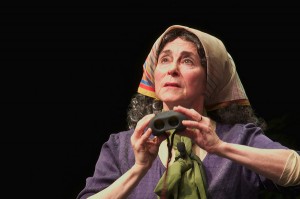One-person play impresses audience
It is not often one gets to witness a one-person show, much less an entertaining one. Nevertheless, despite minor ups and downs, Pigeon, the latest one-woman play by Claudia Stevens, took flight at the Ronald Tutor Ballroom on Tuesday.

Leading lady · With convincing acting and a carefully sculpted dialogue, Claudia Stevens shines in her own mono-character play, giving audience members a unique ride filled with witty remarks and an intriguing agenda. - Photo courtesy of USC Spectrum
The play’s topic is grim, featuring strong indictments of human cruelty to animals, but Stevens, a playwright and actress, has the experience to handle it. A graduate of Vassar College, University of California, Berkeley and Boston University, Stevens studied piano, singing, acting and composing before turning her attention to playwriting. Since then, she has written 15 musical solo plays that have been performed throughout the United States.
Pigeon, her latest creation, follows a lecture of environmental advocate Dame Miriam Rothschild, who, before her advocacy for animal rights, killed and dissected pigeons during World War II. The play poses questions like, “Under what conditions is it okay to kill animals?” and “Is a human life worth more than an animal’s?” Taking the stage solo, Stevens attempts to answer these questions.
“[The piece] starts with the glories of nature,” Stevens said. “Then we look back and see how dark the story really is.”
Stevens got the inspiration for the play from friends at Cornell University who were familiar with Dame Miriam Rothschild. One of her friends, the late Thomas Eisner, suggested Stevens make her the subject of a play.
“The Cornell folks, knowing about some of the other things I had done said, ‘Oh, this is something you should look into,’” Stevens said. “And so I did.”
For the most part, the play is strong, and at times, deeply moving. There are moments of potential awkwardness when the music gets too loud or when the audience refuses to respond to Stevens’ questions, but Stevens herself performs well.
Though her acting is convincing, her lines appear too rehearsed at times. She assumes a consistently convincing British accent that never once falters, and adopts the slight stoop of a woman in her seventies, commanding the attention of the audience with her authenticity.
Though she has no one on stage to play off of, Stevens creates her own energy. She calls on audience volunteers, uses a well-crafted score accented with pigeon calls and relies on her own stellar, operatic vibrato to add a musical element to the piece.
In addition to great sound and visual design, the play is well-written. Though it might go over the heads of some unfamiliar with World War II or historical figures of the period just before 1984, the monologue is natural and consistent, keeping with Stevens’ senior-like persona. Stevens has moments when she is haunted, wise and comical; she makes herself a fully developed character.
The play also ensures that the audience, if it was unsympathetic to the cause before, realizes just how sickening animal cruelty can be. Through aptly-timed graphic descriptions, Stevens describes how exactly the pigeons were killed.
According to the play, the “humane” way to kill a pigeon is to separate its head from its spine by putting the bird’s body behind its shoulders and pulling it into two separate directions — that way, the death is purported to be painless.
The pigeon killing was supposed to save the cattle population from disease and, as a result, to save the starving British citizens who were supposedly suffering during the blockade.
“Apparently Rothschild was in favor of doing this very quick and painless task,” Stevens said. “But her conscience was not completely clear. Toward the end of her life, she would never even kill an insect.”
But before the audience feels too distanced, Stevens turns back around and points her finger at the viewers, asking audience members to recall times when they, as children perhaps, were cruel to animals for curiosities sake, to simply see what would happen.
“We live in a world that’s not simple,” Stevens said, as Rothschild. “It is full of contradictions. We are full of contradictions.”
The state of the human versus animal debate today is at the crux of Stevens’ play.
“It’s a mixed picture, but I think we have become more fully human,” Stevens said. “We don’t do wanton killing anymore, but we have to somehow put a brake on ourselves to prevent us from doing truly dreadful things. But there is a possibility in our nature though we’re not over that hill yet.”
